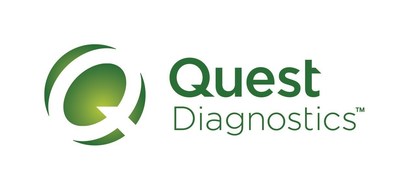MADISON, N.J., Oct. 8, 2015 /PRNewswire/ -- Genetic testing for mutations beyond those currently recommended in medical guidelines may aid the identification of more couples at risk of having a child with cystic fibrosis, according to a study presented today at the 2015 American Society of Human Genetics (ASHG) Annual Meeting, which runs through October 10 in Baltimore, Maryland. The study is one of four that scientists from Quest Diagnostics (NYSE: DGX) are presenting at the conference this week demonstrating the clinical value of genetic tests to help predict or detect disease.

In 2004, the American College of Obstetricians and Gynecologists (ACOG) and American College of Medical Genetics (ACMG) recommended physicians offer test panels based on 23 mutations of the CTFR gene known to cause cystic fibrosis to couples to help identify carrier status. According to the Quest study, a 155-CFTR gene mutation panel detected pathogenic CFTR mutations in 340 of 11,568 specimens tested by the company. Of these, 61 (18%) were not part of the 23-gene ACMG/ACOG panel. The Quest scientists determined pathogenicity of the mutations based on peer-reviewed, published medical research and other criteria demonstrating that the mutation causes classic cystic fibrosis and not milder forms of the disease. Overall, 29 of the non-ACMG/ACOG panel mutations were detected in at least one sample.
In 2010, scientists from Quest Diagnostics published research in Genetics in Medicine that found that testing for CTFR genetic mutations beyond those medically recommended by ACOG/ACMG is unlikely to prevent the birth of children with classic cystic fibrosis and may even detect mutations causing only mild disease. Since that time, many commercial and research laboratories have adopted next generation sequencing (NGS), an advanced and more cost-effective form of DNA analysis that produces large quantities of genetic data.
"The present study highlights the rapid-fire pace at which next generation sequencing is producing novel insights that can improve the detection of disease risk," said Charles (Buck) Strom, MD, PhD, vice president of genetics and genomics, Quest Diagnostics, who was an investigator for both studies. "In our analysis, NGS testing of clinically actionable mutations beyond those now recommended detected a large percentage of pathogenic CTFR mutations that would have otherwise been missed. Reconsideration of current practice guidelines for genetic testing for people to identify cystic fibrosis carrier risk may be appropriate in light of this research."
Cystic fibrosis is a genetically inherited disease that progressively damages the respiratory and gastrointestinal systems. About 30,000 individuals are affected in the United States, and as many as one in 29 are carriers. Quest Diagnostics provides the 155-CTFR gene mutation test under the brand name CFvantage® to physicians in the United States.
Molecular Combing Useful in Diagnosing Facioscapulohumeral Dystrophy (FSHD)
During an oral presentation yesterday afternoon, Quest Diagnostics' investigators presented results of a study that found that molecular combing identified certain genomic characteristics that indicate facioscapulohumeral dystrophy (FSHD), the third most common muscular dystrophy. FSHD is due to a contraction, or decrease in copy numbers, of an area of the 4qA allele. Current diagnostic testing for FSHD by southern blot may lead to indeterminate results in up to 23% of cases, as it can miss certain borderline contractions and other abnormalities. Molecular combing is a novel technique that involves visualizing DNA fibers directly so it may be able to detect abnormalities other techniques miss.
Of 189 specimens tested by Quest, 85 cases had either abnormal or borderline FSHD results, based on the number of 4qA allele copy number repeats. Molecular combing was found to be able to determine the repeat size and differentiate the 4qA allele from non-FSHD causing 4qB, 10qA, and 10qB alleles. Discriminating 4qA & 4qB alleles prevented 9 false positive results (5%). In addition, the investigators observed a correlation between the number of 4qA allele repeats and the average age of the individuals who had an abnormal result. Predicting the age of FSHD onset may aid life planning decisions.
"Quest's research supports our belief that molecular combining is a potential game changer in genetic testing because of its ability to detect and analyze variants other technologies may miss," said Dr. Strom, study co-author. "We look forward to additional research on molecular combing as an aid in diagnosing FSHD, and to continuing to explore its potential for other complex genetic diseases, such as inherited breast and ovarian cancers caused by BRCA 1 and BRCA 2 gene mutations."
Quest Diagnostics retains exclusive rights to develop, validate and market tests in the United States based on molecular combing through an agreement with IP-owner Genomic Vision.
Earlier today, Quest scientists also presented findings of a study based on Quest's lab data of the use of oligo-SNP array analysis and results classification for invasive prenatal diagnosis in 3,091 high-risk pregnancies. Tomorrow, they will present research showing the value of oligo-SNP array analysis in determining type of molar pregnancy, which can influence subsequent monitoring and clinical management of the patient.
Quest Diagnostics has a vigorous research program focused on advancing the clinical value of laboratory diagnostics. The company's medical team, which consists of about 700 MDs and PhDs, published nearly 150 publications, including approximately 85 peer reviewed journal articles, last year.
About Quest Diagnostics
Quest Diagnostics is the world's leading provider of diagnostic information services that patients and doctors need to make better healthcare decisions. The company offers the broadest access to diagnostic information services through its network of laboratories and patient service centers, and provides interpretive consultation through its extensive medical and scientific staff. Quest Diagnostics is a pioneer in developing innovative diagnostic tests and advanced healthcare information technology solutions that help improve patient care. Additional company information is available at QuestDiagnostics.com. Follow us at Facebook.com/QuestDiagnostics and Twitter.com/QuestDX.
Contacts:
Wendy Bost, Quest Diagnostics (Media): 973-520-2800
Dan Haemmerle, Quest Diagnostics (Investors): 973-520-2900
Logo - http://photos.prnewswire.com/prnh/20150422/200883LOGO
To view the original version on PR Newswire, visit:http://www.prnewswire.com/news-releases/testing-for-more-cystic-fibrosis-mutations-than-recommended-by-current-medical-guidelines-may-identify-a-greater-number-of-potential-carriers-finds-study-presented-at-2015-ashg-annual-meeting-300156892.html
SOURCE Quest Diagnostics